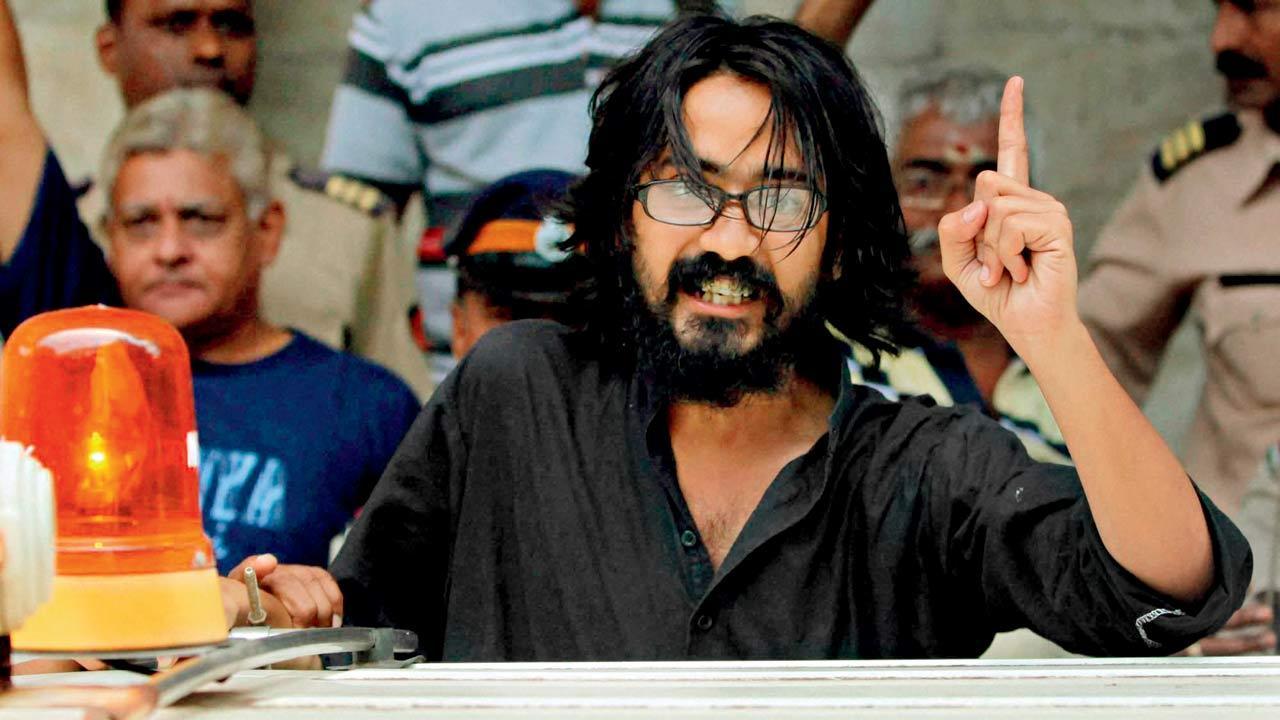According to experts, though the word sedition is missing in the new laws, its provisions has been retained with enhanced quantum of punishment

Political cartoonist Aseem Trivedi was arrested on charges of sedition. File pic
By merely removing the word - ‘sedition’ from the Bharatiya Nyaya Sanhita (BNS) and the term seditious from the Bharatiya Nagarik Suraksha Sanhita (BNSS), do the new criminal laws outlaw sedition? The framers of the new criminal laws have ensured that provisions of the draconian section remain in the new criminal law with enhanced quantum of punishment, which is now increased to seven years from three years in IPC, and may also be liable to a fine, say advocates, social researchers and human rights activists.
Stifling free speech
According to advocate Mohini Priya, advocate on record (AOR), Supreme Court, the removal of the word sedition from the Bharatiya Nyaya Sanhita (BNS) and its replacement with section 152, which criminalizes acts endangering the sovereignty, unity, and integrity of India, reflects a rephrasing rather than an elimination of the offence. “Both section 124 A of the IPC and section 152 of the BNS broadly interpret dissent, thereby potentially stifling free speech and democratic principles. The new provision, with its increased penalties and vague definitions of ‘subversive activities’ and ‘feelings of separatist activities’ poses similar risks of misuse as its predecessor, especially in the absence of judicial interpretation that previously limited section 124 A’s scope,” said advocate Mohini.
Enhanced punishment a concern
“Supreme Court’s scrutiny, highlighted in its recent referral of the case of S G Vombatkere versus Union of India to a constitution bench, emphasizes the necessity to distinguish between ‘state’ and ‘government’ in Article 19(2) to evaluate the constitutional validity of such laws. The enhanced punishment under the BNS raises significant concerns about the commitment to protecting civil liberties, as the process of arrest and extended detention can be weaponized, making the criminal process itself a punishment. Thus, while attempting to modernize, the BNS perpetuates the colonial mentality of an all-powerful state, necessitating a critical reassessment of these laws in light of democratic values and constitutional safeguards,” Mohini said.
Sinister and draconian
Venkatesh Nayak, director of Commonwealth Human Rights Initiative (CHRI), New Delhi, gave a similar view. “I believe, section 152 of BNS which replaces section 124 A of the IPC is more sinister and draconian while superficially appearing to address the reasons why the hon’ble Supreme Court had placed it in abeyance two years ago. While it is nobody’s case that the constitutionally guaranteed freedoms should be deployed to excite secession or precipitate armed rebellion, the inclusion of vague phrases like exciting “subversive activities”, encouraging “feelings of separatist activities” create more room for the government to criminalise legitimate dissent of its policies and actions or even its deafening silence and palpable inaction. For example, if people who have suffered due to the unending violence that has engulfed large parts of Manipur were to publicly ask what has the Indian State done to protect their lives and liberty and whether they are better off charting their own destiny, such speech could become punishable under section 152 of BNS,” said Nayak.
Up to seven years or for life
“Farmers’ protests against the three farm laws that we witnessed a few years ago would be labelled ‘subversive activities’ and they could be put away in jail for up to seven years or for life. This is up from the three-year prison term that the erstwhile sedition law had stipulated in addition to a life sentence in extreme cases. Despite a plethora of Supreme Court judgments clarifying what is or is not ‘seditious’ speech or activity, a substantial measure of that wisdom has not been distilled into Section 152 of BNS. Despite tall claims of ‘decolonisation of the criminal laws’, the government has not been able to free itself of the colonial mindset which treats all kinds of dissent as dangerous to the existence of the State,” Nayak.
Open to misuse
“Another important aspect is that under section 127 (security for good behaviour from persons disseminating certain matters) of BNSS, there is reference to ‘certain matter’ and dissemination, which is a partial retention from section 108 (security for good behaviour from persons disseminating seditious matters) of the CrPC. A serious concern emanates from lack of clarity on the meanings and scope of terms mentioned under Clause 150 of BNSS. Take the example of ‘subversive activities’ which in the absence of a legal definition in the BNSS leaves it open to misuse and wrong use,” said Valay Singh, Project lead, India Justice report.
Cartoon not sedition
Interestingly, section 152 of BNS under the comments section reads, “Cartoons displaying anger and disgust and do not create problems in law and order cannot attract the ingredients of sedition.” The section penalises such activities as would be intended or have a tendency to create disorder or disturbance of public peace by resort to violence. The law concerning sedition came under spotlight with the arrest of political cartoonist Aseem Trivedi on September 8, 2012.
Cartoonist Aseem Trivedi speaks
Political Cartoonist Aseem Trivedi expressed his satisfaction that the new BNS Act has considered the High Court directives in his case. “The clarification in the law that ‘Cartoonist criticising the government is not sedition’, is itself a victory for cartoonists like me and many others who use their feelings to express and get the cartoons published. The freedom of speech and expression is guaranteed under Article 19 (1) of the Constitution and as a cartoonist, I would continue to express my thoughts and feelings, without the fear of being booked for sedition, anymore,” he said.
 Subscribe today by clicking the link and stay updated with the latest news!" Click here!
Subscribe today by clicking the link and stay updated with the latest news!" Click here!










